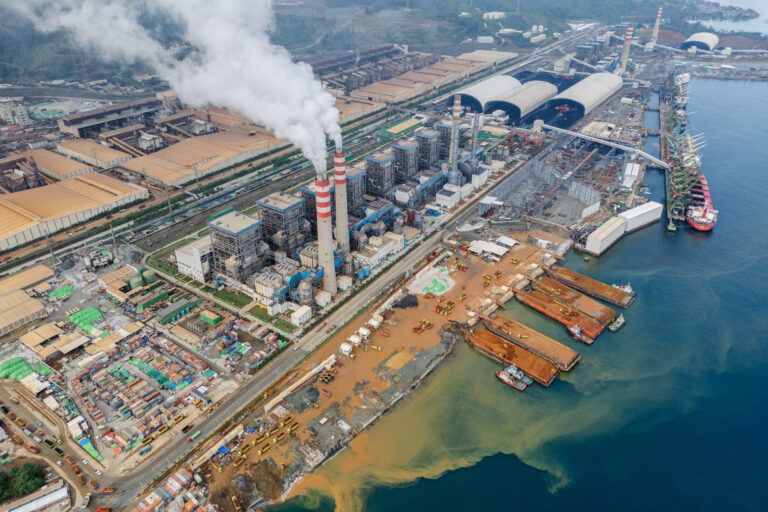Read in: Bahasa Indonesia | Full Report
(Los Angeles, June 5, 2025) — The owners of the multi-billion-dollar Indonesia Weda Bay Industrial Park (IWIP) in eastern Indonesia and nearby nickel mining projects are violating the rights of local communities, including Indigenous Peoples, Climate Rights International said in a report released today. Nickel mining and processing is causing significant deforestation, air and water pollution, and emitting massive amounts of greenhouse gases from captive coal plants.
The 55-page report, “Ongoing Harms, Limited Accountability: Climate, Environmental, and Human Rights Violations in the Indonesian Nickel Industry,” found that the Indonesian government, nickel companies, and electric vehicle companies have failed to respond meaningfully to serious and well-documented human rights and environmental abuses. Indonesia is the world’s single largest producer of nickel, a transition mineral used in the production of electric vehicle batteries. Much of the nickel ore destined for IWIP is sourced from PT Weda Bay Nickel, the world’s largest open pit nickel mine on the island of Halmahera.
“Despite clear evidence that the rights and livelihoods of communities in Indonesia are threatened by nickel mining and processing, companies operate with impunity, putting profits over people,” said Krista Shennum, researcher at Climate Rights International. “The Indonesian government must listen to local communities and hold polluters accountable. Companies that source nickel from Indonesia, including many electric vehicle companies, should also take full responsibility for addressing egregious abuses in their supply chains.”
Indonesian and foreign companies, in coordination with Indonesian police and military personnel, have engaged in land grabbing, coercion, and intimidation of Indigenous Peoples and other communities, who are experiencing serious and potentially existential threats to their traditional ways of life. Local activists and students who oppose IWIP have faced criminalization, harassment, and smear campaigns. Climate Rights International previously reported on IWIP in January 2024 in “Nickel Unearthed.”
Electric vehicles are a key part of the transition away from fossil fuels. Yet nickel processing at IWIP is powered by eleven captive coal plants, with three additional captive coal plants under construction. Once operational, these fourteen coal plants will have a whopping 4.54 GW of capacity, leading to significant greenhouse gas emissions. Meanwhile, communities living near IWIP do not have consistent, reliable access to electricity. Air and water pollution from the industrial park are likely contributing to a spike in respiratory infections and other health problems. Julfikar Sangaji, a local activist with the Indonesian NGO JATAM, told Climate Rights International about information he obtained from just one community health clinic, in Lelief:
Over a span of three years, the prevalence of respiratory infections has increased by more than 24-fold. I managed to secure data from the local health authority in Central Weda back in 2024. It shows that the number of patients with acute respiratory tract infections has been steadily increasing from 434 patients in 2020 to 10,579 patients in 2023.
Local rivers once used for drinking water, such as the Sagea River, have become unsafe for consumption due to pollution. Water tests by Indonesian NGOs AEER, JATAM, and Nexus3 Foundation in 2023 and 2024 revealed dangerously high levels of nickel and hexavalent chromium, among other pollutants. Residents told Climate Rights International that they no longer trust the water and fear for their health.
“While some nickel mining and processing companies claim that they are regularly testing water quality, they are failing local communities by not making information about the safety of important drinking water sources publicly available and accessible,” said Shennum. “Parents shouldn’t be forced to worry if their children will get sick from bathing or swimming in the same rivers that their families have relied on for generations.”
IWIP is a joint venture of three private companies headquartered in the People’s Republic of China: Tsingshan Holding Group, Huayou Cobalt, and Zhenshi Holding Group. Weda Bay Nickel is owned by Tsingshan Holding Group, Eramet, and PT Antam.
The Indonesian government has failed to hold companies accountable, including through criminal prosecutions and civil penalties. Climate Rights International called on the government to require the three main stakeholders in IWIP to take immediate steps to remedy water and air pollution caused by their operations. Nickel mining companies should properly dispose of mine tailings to minimize pollution. Both IWIP and nickel mining companies should fully and fairly compensate all community members, including Indigenous communities, for their land, and ensure that Indigenous Peoples are able to provide full free, prior and informed consent as established by international human rights law.
Electric vehicle companies such as Tesla, Ford, and Volkswagen that directly or indirectly source nickel from Indonesia or have contracts to source nickel from companies with operations at IWIP should immediately use their leverage to ensure suppliers end and remedy rights abuses, clean up water and air pollution, and transition from coal to renewable sources of energy as soon as possible, Climate Rights International said. Electric vehicle companies should increase transparency by providing public information about all companies in their transition mineral supply chain.
Despite Indonesia’s vulnerability to rising sea levels as an island archipelago, the country’s electricity master plan includes building 20 GW of new captive coal plants over the next seven years—nearly equal to all of Turkey’s current coal capacity. President Prabowo has also raised concerns with his plan to attain domestic “food security,” which would effectively be the largest deforestation project in the country’s history. The project would convert twenty million hectares of forests, including more than two million hectares of protected forests, into food and energy estate projects.
“For the energy transition to be truly just, the rights of communities on the frontlines of mineral extraction must be respected,” said Shennum. “The government should rescind the operating permits of companies that systematically violate rights or cause extreme damage to the environment.”
Photo: Aerial image of part of the Indonesia Weda Bay Industrial Park (IWIP), including captive coal plants and port. August 14, 2024. © Garry Lotulung.







